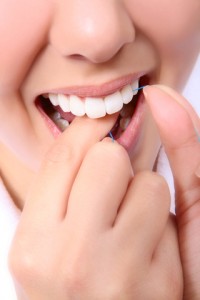Preventive Dentistry

Preventive dentistry is the practice of caring for one’s teeth to keep them healthy. This helps to avoid cavities, gum disease, enamel wear, and more. There are many forms of preventive dentistry, such as daily brushing and annual dental cleanings. These practices are designed to ensure that teeth are clean, strong, and healthy. Children should be taught proper oral hygiene at an early age. The most important part of preventive dentistry is to brush teeth daily with fluoride toothpaste. Most people should replace their toothbrushes three to four times a year or as the bristles start to fray. Daily flossing is also recommended. Flossing helps to clean out the tight spaces between the teeth.
Annual dental cleanings and checks allow dentists to identify problems and take care of them right away. People should see their dentists at least once a year for an exam to check for any problems in the teeth or gums.
Fissure Sealants
Fissure sealants are a safe and painless way of protecting your children’s teeth from tooth decay. It is a plastic coating which covers the chewing surfaces of the back permanent teeth. The sealant forms a hard shield that keeps food and bacteria from getting into the tiny grooves in the teeth thereby reducing the risk of decay in future.
Dental Erosion
Dental erosion is the erosion of the surface of your teeth, including the tooth enamel, due to acids you eat or drink, or acids coming up from your stomach. These acids can dissolve the crystals that make up your teeth, which leads to tooth surface loss. Additionally, these acids can soften the tooth surface, making it easier for them to be worn away by abrasion or tooth grinding (acid wear). Dental erosion can also make any exposed tooth root (dentine) sensitive to hot and cold. Dental erosion, if untreated, can lead to the progressive loss of the surface of the tooth. The loss of tooth structure can require complex and lengthy treatment involving fillings, veneers, crowns and potentially root canal treatment. When the signs of dental erosion are detected, it is very important to determine the cause and modify it.
Gum Care / Gum Infections
Gum disease affects most people at some time during their life. It is usually caused by a build-up of plaque on teeth. One of the common signs of gum disease is bleeding gums. Careful and regular cleaning of your teeth and gums each day can help prevent gum disease.
Getting treatment for dental problems early can help save teeth that are at risk from gum disease and other conditions. See your dentist if you have swollen or bleeding gums or loose teeth.
Pregnancy
Pregnancy can lead to dental problems in some women, including gum disease and increased risk of tooth decay. During pregnancy, your increased hormones can affect your body’s response to plaque (the layer of germs on your teeth).
Pregnancy does not automatically damage your teeth. The old wives’ tale that warns a woman to expect a lost tooth for every baby is false. If the mother’s intake of calcium is inadequate during pregnancy, her bones – not her teeth – will provide the calcium her growing baby needs. This calcium loss is quickly made up after breastfeeding is stopped. However, the demands of pregnancy can lead to particular dental problems in some women.
With proper hygiene at home and professional help from your dentist, your teeth should remain healthy throughout pregnancy.
You are less likely to have dental problems during pregnancy if you already have good oral hygiene habits. Suggestions include:
• Brush your teeth at least twice daily with fluoridated toothpaste.
• Floss between your teeth.
• Visit your dentist regularly.
If you are planning on getting pregnant, see your dentist. It is more convenient to have elective procedures done before you conceive. If you require dental treatment during pregnancy, non-urgent procedures are often performed after the first trimester.

